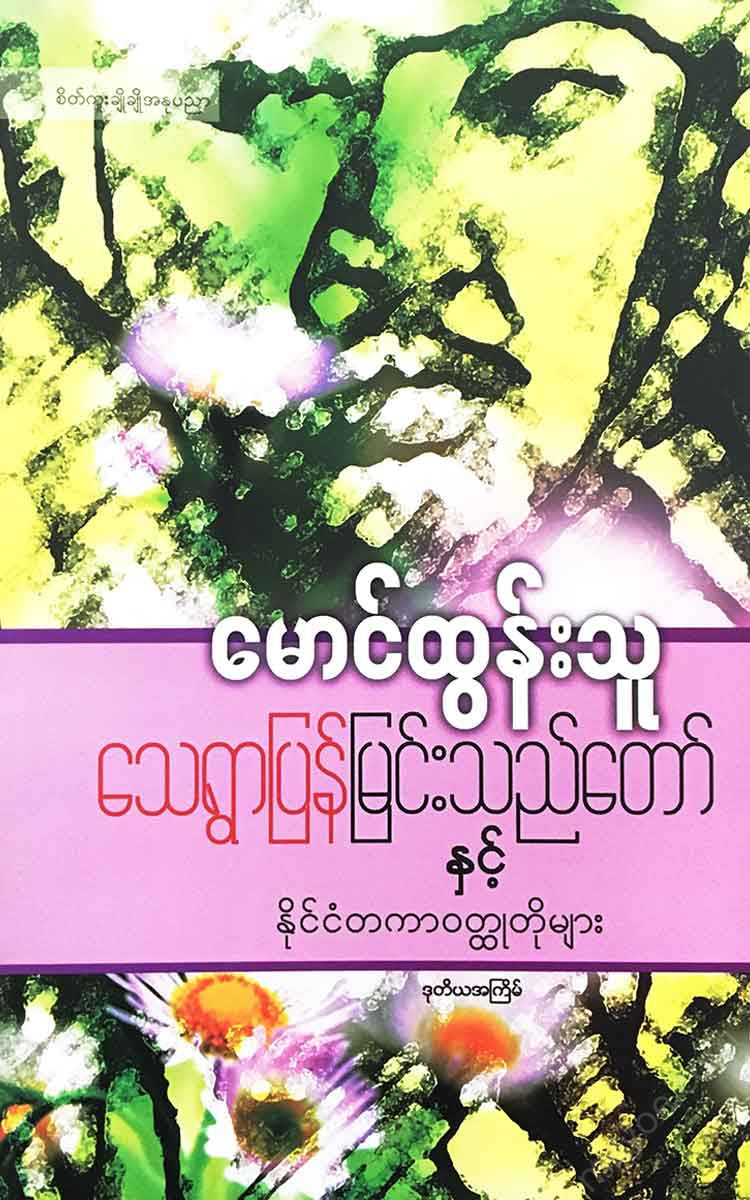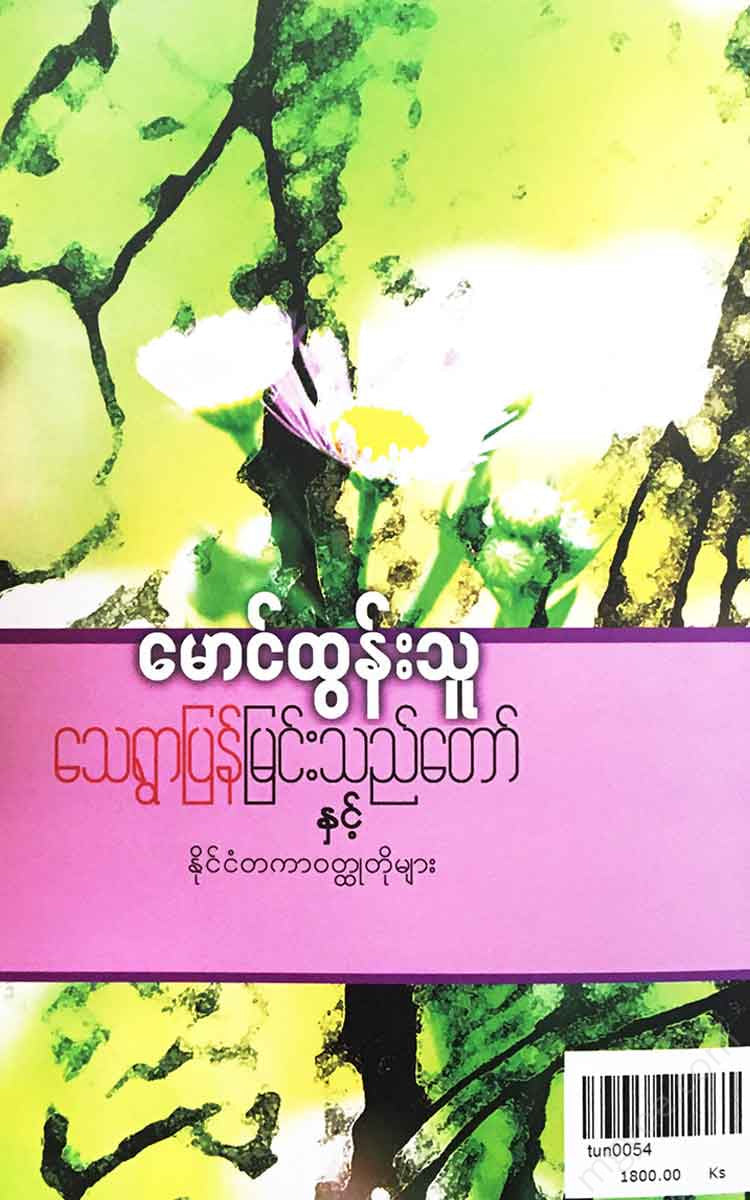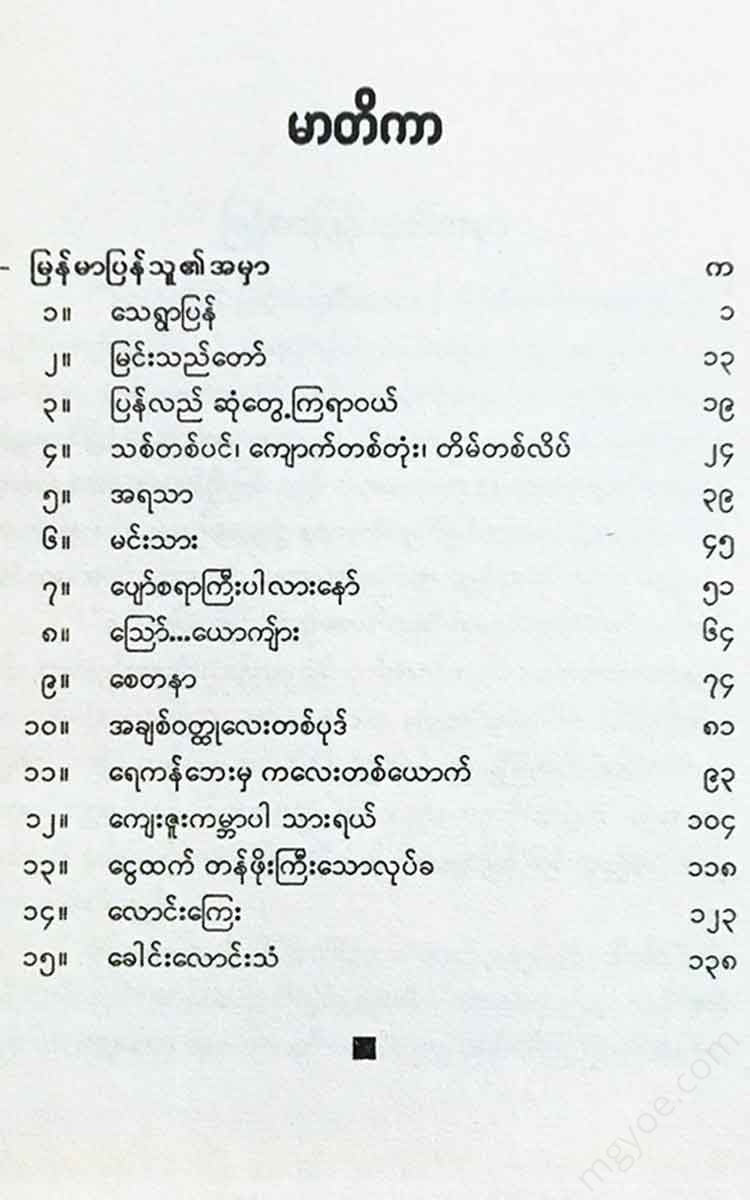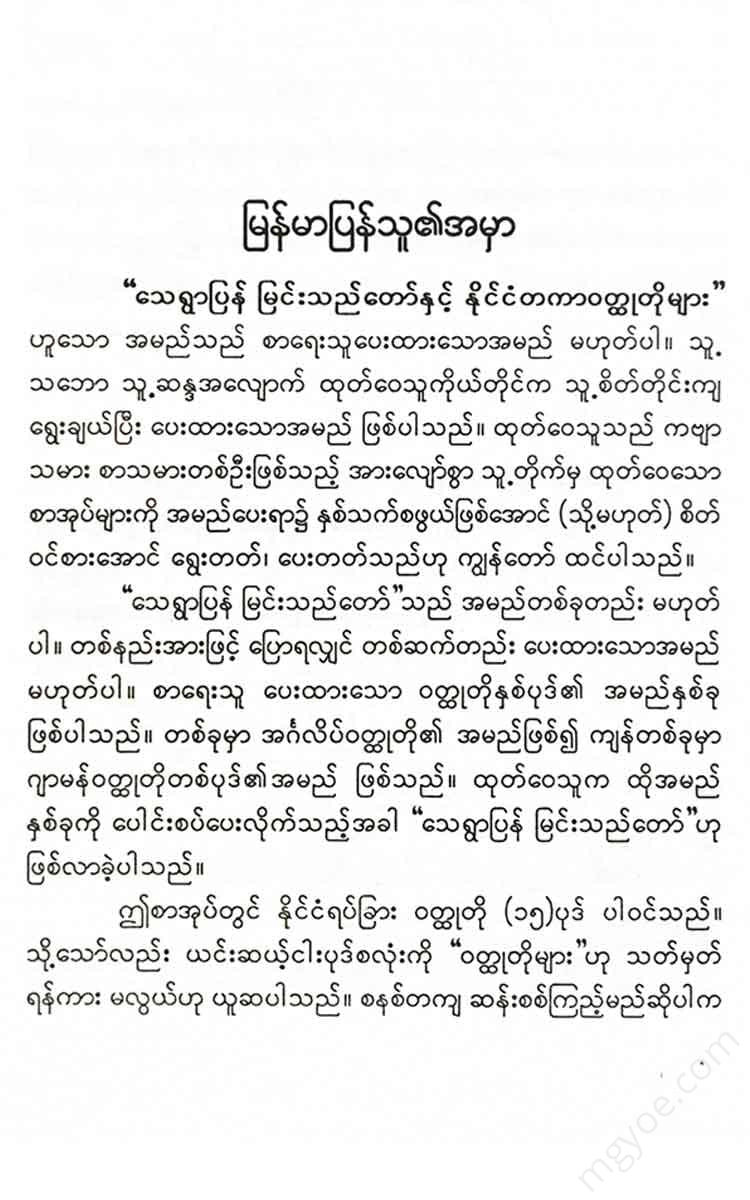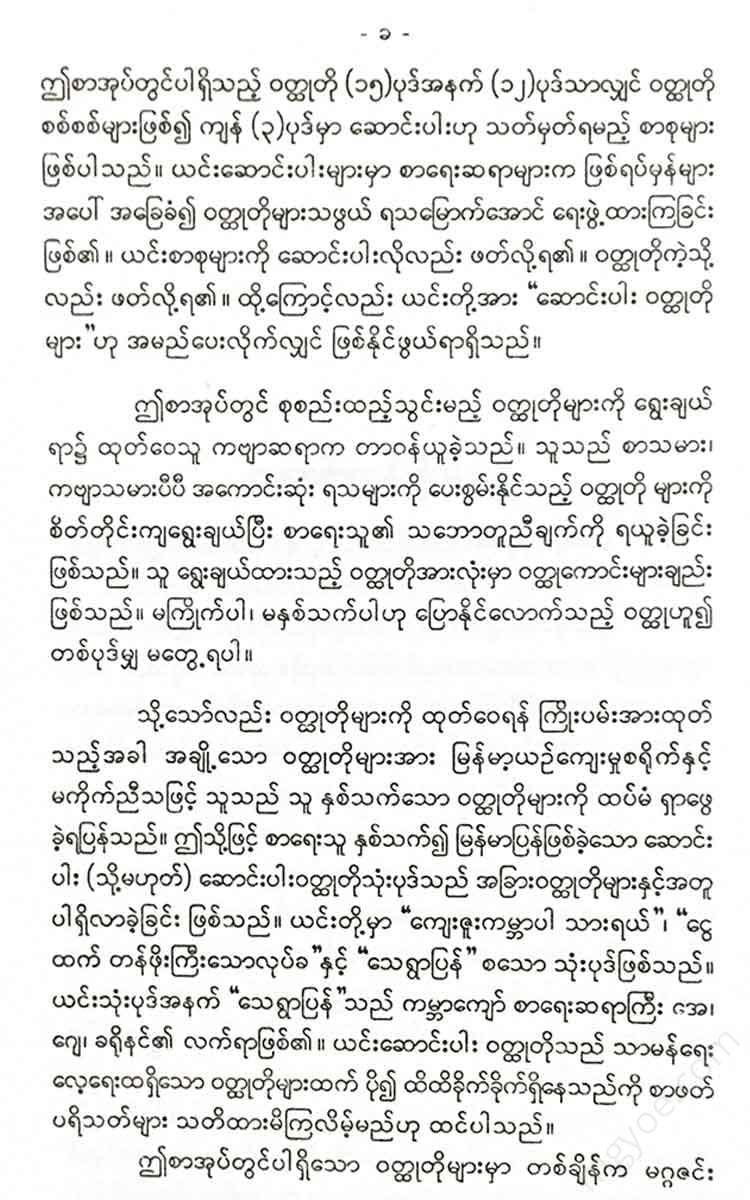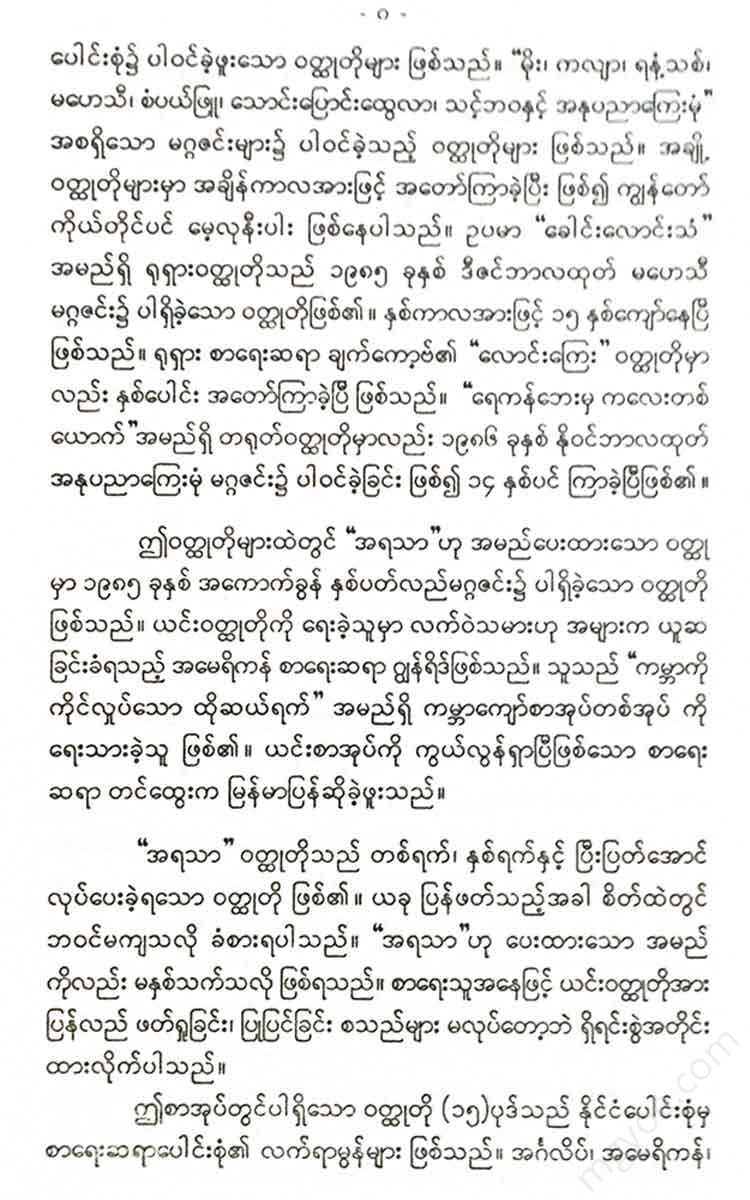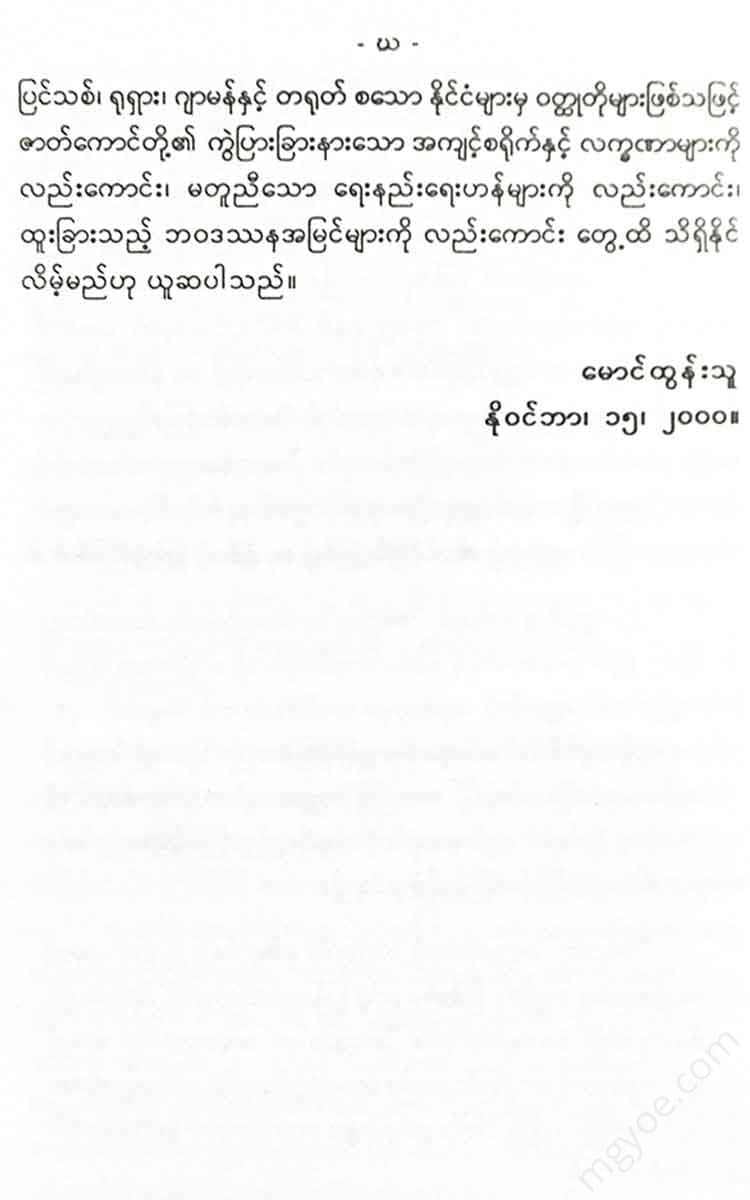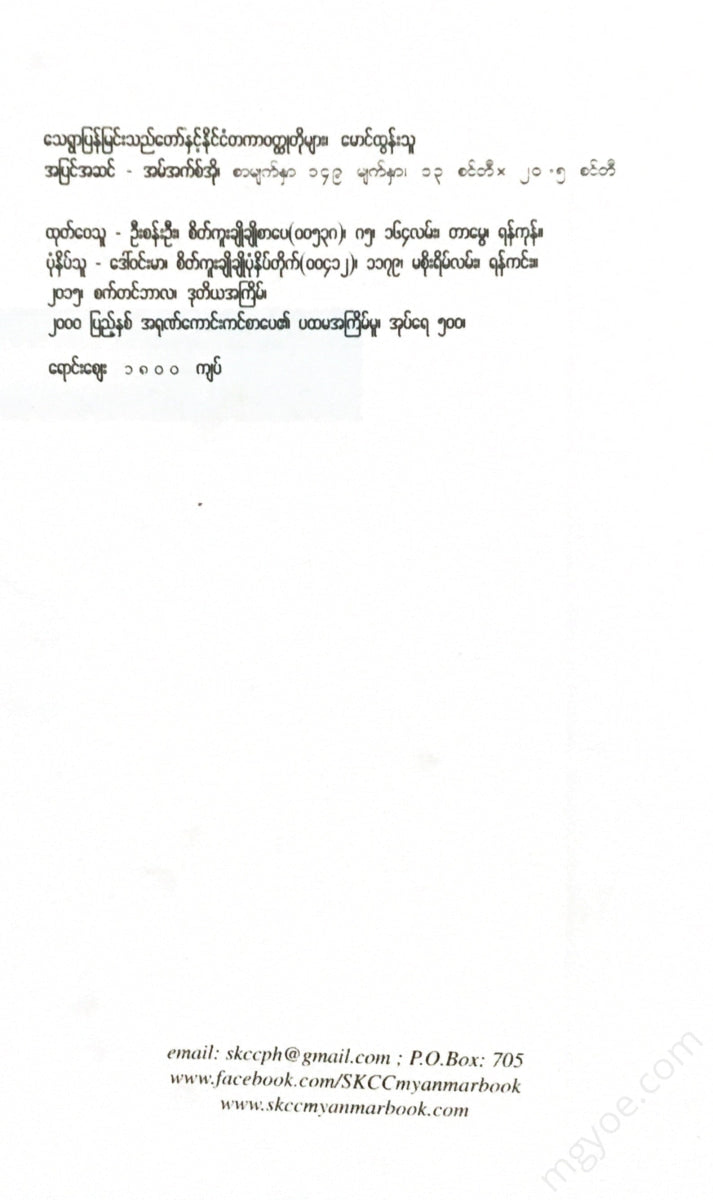စိတ်ကူးချိုချိုစာပေ
Maung Tun Thu - The Return of the Horseman and International Short Stories
Maung Tun Thu - The Return of the Horseman and International Short Stories
Couldn't load pickup availability
Whenever I went out to the village to get water and food, I would push two large cans of cane on a cart. When I got to the village, I would sit outside the village tavern and chat with the owner, Luis. Luis is old but still lively. Before settling down in the village, he had worked as a steward on the Lisbon Rio ferries, so he spoke a fair amount of English, which was a great help to me, who only spoke Portuguese for meals and drinks. He made it very easy for me to buy bread, cheese, and canned fish, the staples of this very old region. And he would also make a special drink that cost four cents a glass, which would be refreshing and refreshing for someone who had been walking in the sun.
The restaurant faces the village park. It is a very pleasant place. In the Algarve region, people are poor. Villages cannot have parks. Some towns do not even have parks. This village does not have one. There is a small park. This park is a sight that will always be remembered. The bluebells in the park have been blooming for weeks. Their flowers cast a beautiful shadow on the whitewashed church wall. Roses of various colors and hyacinths are beautiful among the trees. White hyacinths are blooming in full bloom.
It was late afternoon and the view was breathtaking. A village built over centuries on the sandy terrain of the El Grande. The village was lovely, with its winding streets and low-roofed houses. The changes called civilization have passed over this land inland from the sea. Yet this place is still outside the world. To this day, kerosene lamps are still used. The long summer months are still dry. The wheat stalks are still threshed with flails. Large round loaves of bread are still baked in large outdoor ovens. For transport, horse-drawn carts still move along the sandy streets.
As I drifted in my thoughts, Louis, with his usual worried expression, was watching me carefully. He knew that I was a man who had come to rest in a remote place, five miles from my village, to recover from a lung ailment, and so he inquired about my health as was his custom.
"How are you today, amigo? Are you comfortable sitting down?"
I nodded my head in the opposite direction and replied, "This park always makes me feel good."
“Yes,” he agreed. “We are proud of this park. And we are proud of the man who built it.” He paused for a moment before continuing. Then he said, “He built this park after he died.”
"You mean he left money for the park in his will?"
"Oh...no," he said with a smile. "Joao Jacinto has no money. He's a fisherman. Where is the money?"
He was looking off into the distance. He seemed to be waiting for me to say something, surprised and mumbled. Then he spoke calmly and slowly.
“About 30 years ago, João was not a very remarkable young man. He was a strong, handsome man. He had a dark complexion, dark hair, and white teeth. To be honest, he was a bit ugly. But he was not so ugly when he got engaged to a beautiful woman, Minuy Maria. Maria worked in a fish cannery in Portimao. She was a girl who had a regular income and lived according to a schedule.
"Well, as I said, Joao goes to sea. He doesn't have a comfortable job like mine. His job is a very hard fisherman's job. He has to catch cod, which is a big fish.
“The cod fishing crew sailed to Newfoundland for six months a year. When they got there, they had to put out to sea in their own little boat before dawn. They had only a loaf of bread and a liter of wine on board. They had to spend the whole day with the little one, and at night they had to put the nets back in, enduring the freezing cold. It was a very tiring job.”
"There are too many dangers."
"Of course, and the weather is not good. The sea is always foggy. Boats often get lost and drift for days at a time. In such cases, you have to blow on the conch shell constantly to keep in touch with your ship."
“And since we have to blow the horn constantly to avoid collisions with other large passenger ships,” I added, thinking of a major disaster.
He was quiet. He accepted my son. Then he kissed him. “Oh, that’s it. After two days of fishing, Mary (the fisherman) came back to the dock. The fishermen gave him the sad news. What a terrible thing. But, Amir, these things don’t happen once. They happen all the time, so we have to accept them. .
And so, João's funeral was held in the church. Everyone was dressed in black. Even the coffin, which was made for drowning, was completely black. João's mother, who was sitting in the front pew, was crying in grief.
“Now that João Jacinto is dead, young men from the village approach Maria to marry her. They propose marriage. Maria buys a plot of land with water with the money she received as a bride price. Within six months, she is married. Once she cried with grief, but now she smiles with joy.
“Not long, we’ve been married for about a month,” he started, then abruptly cut himself off. “Well…it’s not right to talk about this incident too much. The ship that hit João Jacinto swept him out of the water. His injuries were worse than the ship that hit him. Many of his ribs were broken. Both of his legs were crushed. The worst part was that he put his hand on his hip and said, “I’m crushed to pieces here.”
“The ship that hit Joao was not a big ship like you say. It was a small Panamanian cargo ship that was loaded with ore from Halifax and headed for the Suez Canal. Whatever it was, it was thanks to the people on board that he survived. They gave him the best treatment they could in Colombo. But his wounds were so severe and so severe that they were of little use. After several months, they sent him back home. He was a cripple with no strength in both legs. He was a man who could only walk with a cane. He was dragging one leg.”
He slowly put out his cigarette. He knew I was interested, so he tried to drag out his story.
“His return from the dead came in the worst possible way. It was a shock to everyone in the village. Everyone was upset. It was heartbreaking to think about it. We all buried him. We lit candles for him in the church. We prayed for his well-being. Then we danced at his girlfriend’s wedding. We jumped. Oh... now he’s back. Just think about it, Amy. Oh... everyone’s talking about it, it’s getting complicated.”
Luis looked at me with a mischievous smile. “Some people said it was better for João to drown. Others said it would be better if the locals didn’t send him back but kept him. Whatever. We, the villagers, thought it would be better if we did justice to him. Finally, we thought it would be better to find a job for João to be safe, and to do something that would be comfortable for him. So they hired a cleaning worker at the Rural Development Office.
“At first, João refused, he refused. But he still had an old mother to take care of, didn’t he? And it was not easy to find work elsewhere. So he accepted the job. He could use the broom as a tool. He could also sweep the garbage. He swept the broom slowly. He didn’t look up at anyone while he was sweeping. He just stood there, his work standing up straight. Sometimes he got angry with the villagers and the people for Maria.
“One day, while he was thinking about her and feeling depressed, a sad incident happened. He hadn’t seen Maria since he returned to the village. I think Maria was deliberately avoiding him. But that day, Maria came out of the house dressed beautifully. She had a beautiful scarf around her neck. She was a married woman with a husband who could provide for her. She was also riding a bike that she had recently bought. .
"At first Maria didn't look at me. Then she couldn't help but look at Joao with a look of pity. But I think Joao looked at her with a look of contempt."
"Maria left too," Joao said, "for a long time. Then, in a very bitter tone, he said, "What's the matter with him? He's like everyone else. He's the man who ruined my life. I've been thinking about it for a long time. Now I'm going to do what I think."
“What are you going to do, Joao?” I asked.
“I'll do something memorable. That way they'll always remember me, and they'll be ashamed every time they remember me,” he replied.
“The next morning, I opened my Chinese glasses and saw Joao working. He was digging up the empty plot. He was taking the stones and moving them to a different place. He was leveling the whole area.”
"He's so weak that I don't think he can use a similar one. What does he look like?" I interrupted.
“I think Amiro has forgotten,” replied Luis. “In Portugal we rarely use a shovel. We use a shovel most of the time. A shovel requires a lot of strength. And now João has very strong hands. I watched him work. What could be easier if he started? But he finished. The soil was soft. There were no stones - no. Later he went to the office manager and asked him to buy twenty plants of the twelve-season tree. When he got them, he planted them in the ground he had dug.
“It’s definitely progress. But João doesn’t think this little bit of progress is enough for him. He’s not a professional gardener. He knows he still has a lot to learn about growing trees. That’s why he takes the bus to the state farm in Faro twice a week to study. And by spring, he’s already gained a lot of knowledge about growing plants. He already has a lot of seeds and seedlings.
“That spring was the best season for Joao. As the plants he planted grew and came to life, his mind began to change. Signs of his self-confidence began to appear. He would sit in his empty plot of land all day long, digging, hoeing, planting, weeding, and watering, with hardly any free time. He would also trim the twelve perennials planted around the perimeter with a pair of scissors. Even though he was working, his legs hurt. But he didn’t say much. He just patiently did what he had to do.
“The best case scenario is that it will happen next fall. A man from the state farm came to see Joao’s garden. He brought 14 blue diamond trees and gave them to him. They were so beautiful. Amiro knew that these trees take years to grow and bloom.
“Actually, what Amiro sees now is the result of a long process. João created the garden. The garden created João again. And vice versa. Don’t think that João has become a saint. He has never forgiven Maria. But he is not as harsh as before. He has gained a lot of wisdom, knowledge and understanding. Now he even reads the poems of our great Portuguese poet, Carmos.”
Louis was silent for a moment. Then he raised his hand and pointed at a man in the park.
"See that over there, that's him"
"What?" I muttered in surprise. "Is that old man Joao?"
"Oh...he's not as old as I am," Louis smiled. "He's been through more than I have, he's getting old. Why don't you go and say a word or two to him, Amy?"
We crossed the cobblestone path and entered a garden filled with the scent of flowers. Joao walked towards us. He was short, hunchbacked, and ungainly. He wore an old, wide-brimmed hat. He wore a faded blue shirt. He walked with one leg limping.
But the way he walked was not pitiful. He did not seem to be feeling sorry for himself. The calmness of his face as he stared at me was overwhelming. His gaze did not move from me while Louis spoke to him. Then, with a calm smile, he extended his hand towards me.
How can one speak to such a person? Simply giving compliments is not enough. Giving compliments with superficial pretense can be like committing a forgivable sin. I turned to Louis and said a word.
"Like the great poet Carmos. Tell him he has composed a poem too."
That night I was in the starry sky.
